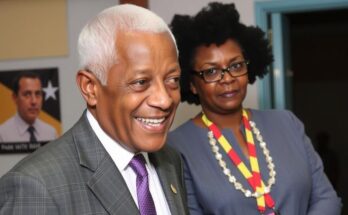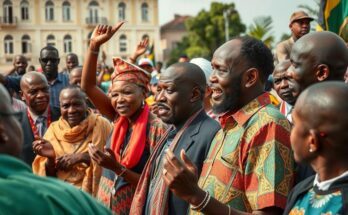In their first and likely only debate, Vice Presidential candidates Senator JD Vance and Governor Tim Walz exchanged views on pressing national issues, including foreign conflicts and climate change. Vance defended Trump’s previous foreign policy, while Walz emphasized the need for steady leadership. The debate also covered immigration and healthcare, concluding as the candidates prepare for a closely contested election with just five weeks remaining.
In a highly anticipated and contentious debate, Vice Presidential candidates Senator JD Vance (R-OH) and Governor Tim Walz (D-MN) confronted each other on a range of critical issues during their first and likely only debate of the election cycle. The debate, moderated by CBS, spanned 90 minutes and featured profound exchanges regarding the escalating conflict in the Middle East, particularly following Iran’s recent missile strikes on Israel. Senator Vance asserted, “Donald Trump actually delivered stability in the world and he did it by establishing effective deterrence. People were afraid of stepping out of line.” In contrast, Governor Walz emphasized the necessity for steady leadership, criticizing former President Trump’s previous debate performance and questioning his suitability for current global tensions, stating, “What’s fundamental here is that steady leadership is going to matter.” The discourse further shifted towards the implications of climate change as the candidates discussed Hurricane Helene and its ramifications. “There’s no doubt this thing roared onto the scene faster and stronger than anything we’ve seen,” remarked Walz, pointing to Trump’s dismissive remarks about climate change as a “hoax.” Conversely, Vance challenged the Democratic approach, claiming, “What the president has said is that if the Democrats, in particular Kamala Harris and her leadership, if they really believe climate change is serious, what they would be doing is more manufacturing and more energy production in the United States of America.” Other pivotal topics including immigration, economic policies, healthcare, and abortion were also deliberated, with the candidates remaining engaged throughout due to the absence of a microphone cutoff—a significant departure from standard debate protocols. As the night progressed, Walz pressed Vance on the outcome of the disputed 2020 presidential election, to which Vance did not provide a direct response. This debate concluded the candidates’ public face-offs as polls indicate a tightly contested race just five weeks before the impending election.
The 2024 election cycle is heating up, with Vice Presidential candidates emerging as pivotal figures in the campaigns. This particular debate held significant importance as it was likely the only opportunity for Vance and Walz to publicly deliberate on key national issues before the election. As the nation grapples with challenges like foreign conflicts and climate change, voter attention is turning towards candidates’ stances on such pressing matters. Furthermore, the controversial topics that shaped the 2020 election, such as immigration and healthcare, remain highly pertinent, and the debate provided these candidates a platform to clarify their positions. With national and battleground polls indicating a close race, every public appearance carries substantial weight.
In conclusion, the final debate between Senator JD Vance and Governor Tim Walz highlighted contrasting perspectives on critical issues such as foreign policy, climate change, and election integrity. The candidates’ responses reflected their party’s ideologies and provided voters with a clearer understanding of their proposed approaches as the election date approaches. With tightly contested races in the polls, the outcomes of these discussions could play a pivotal role in influencing voter decisions. As the campaigns progress, both candidates will need to leverage their debate performances to solidify their footing among the electorate.
Original Source: www.mysuncoast.com




